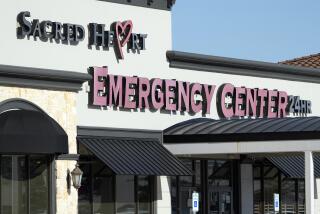Op-Ed: Why many hospice doctors like me won’t participate in legal physician assisted suicide
- Share via
On June 9 California will join four other states — Oregon, Washington, Vermont and Montana — in allowing physician-assisted suicide. Meanwhile, my state, Arizona, and a dozen or so others are considering their own “right to die” laws. As a hospice physician, about twice a year I am asked by a patient to prescribe a lethal dose of a medication. Oncologists throughout the country report that up to half of their patients at least ask about it.
But even if it were legal in Arizona, and I knew a patient met all the criteria established by law, I would still not hasten his or her death. That would be my right as a doctor, and it will be the right of doctors in California as well.
The reasons I won’t participate begin with the Hippocratic oath I took when I became a doctor — “First do no harm.” I have also seen too many late-breaking healed relationships and radical changes of heart in my patients’ last days to think that taking a prescription in advance of the end is the best way to die. Most important, I believe that physician-assisted suicide is an unnecessary defense against fear and suffering.
“Right to die” laws require that patients be screened for depression; they try to make sure they are acting intentionally, with a full understanding of their options. Yet in the records kept by states that have legalized physician-assisted suicide and in my experience in hospice care, I find that people often want help dying because they don’t know what to expect and they don’t want to lose control. They want to choose death with their head, to avoid suffering, and they don’t know that they can do that without a prescription and without the state’s permission.
It is actually easy. They can just stop eating and drinking. In fact, this is the natural process of dying for many people — the body starts to shut down; appetite disappears along with the ability to swallow; the dying stop taking in food or drink.
Here is the surprise: It is a pleasant way to go. Hunger is gone after the first three days. Really. And thirst can be managed by rinsing the mouth or taking ice chips. Patients drift off into a coma over the course of a few weeks. It may be one of the most comfortable ways to die. If, on the other hand, we pump the dying with intravenous fluids and force-feed them with a feeding tube, we may prolong the process and create a worse death, causing coughing, choking and swelling all over the body.
I believe those who push for physician-assisted suicide aren’t educating themselves about how to manage life at its end, or how to have a good death.
I know that a no-food, no-water prescription may seem heartless and difficult nonetheless. It feels counter-intuitive to anyone used to the life-saving mission of hospital medicine. I had to see such deaths in my practice many times to believe that not eating and drinking at the end of life was a good thing.
Dying this way doesn’t preclude pain medication. I can prescribe such medication and I can suggest many ways to keep patients comfortable as they die at home. And if pain can’t be managed with such medication, I can prescribe palliative sedation — a medical coma. Death still comes naturally: No food and water while the patient sleeps.
Some people will say they don’t want to make their families “go through that.” But I know it is often comforting for family members to visit their dying loved one as the process begins and while they are sleeping, to hear their breathing, to have time to prepare for the death and to have a chance to say aloud what might help heal old wounds.
By understanding palliative care and the processes of dying, we can take responsibility for our deaths without fear. I believe those who push for physician-assisted suicide aren’t educating themselves about how to manage life at its end, or how to have a good death. They want agency up to a point, but then they want physicians to be responsible by prescribing a medicine. I won’t take that on.
While legislators decide what is legal and not legal, and while doctors decide if they will or won’t write suicide prescriptions, if you are at the end of your life and you want more control, just turn off the IV. Say no to the food, yes to ice chips, and then rest. Turn on some music; look out the window. The body knows how to die. You know how to die. It is gentle and easy. This I will help my patients do.
Dr. Ann Marie Chiasson is a hospice and palliative care specialist and the assistant fellowship director at the University of Arizona’s Center for Integrative Medicine.
Follow the Opinion section on Twitter @latimesopinion and Facebook
More to Read
A cure for the common opinion
Get thought-provoking perspectives with our weekly newsletter.
You may occasionally receive promotional content from the Los Angeles Times.










